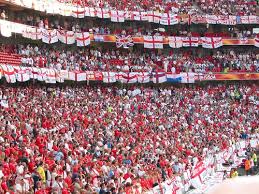By Andrew Warshaw
June 28 – Embarrassing, disbelieving, shameful. And that’s just for starters after the most woeful performance in a major finals for half a century by an England team.
“You’re not fit to wear the shirt” came the familiar cry from the stands following England’s 2-1 defeat to Iceland – where there are no professional clubs – that rekindled memories of being humiliated by the United States in 1950 and sent Roy Hodgson’s team crashing out of Euro 2016, leading to his immediate resignation.
The same old questions remain. How can players who give such a good account of themselves at club level repeatedly fail to deliver when they pull on a national team shirt? It is lack of hunger? Surely not. Is it tiredness after a long domestic season? That, in itself, has become a tired argument.
So what is it? The answer, in all likelihood, comes down to those old chestnuts. Selection blunders by the manager, no trusted system for players who do things differently at their clubs to buy into, inadequate coaching methods and lack of flexibility.
Perhaps the most disappointing and worrying aspect of England’s demise in France is that this was a supposedly vibrant squad that played a more attacking blend of football than past vintages – the Icelandic joint coach said as much in the build-up to the game in Nice. This was not an ageing team on its last legs. This was a new generation of enthusiastic talented players that would go places. Or that’s what we were led to believe. After all, England won all 10 qualifying games and beat Germany 3-2 in an away friendly (not that Germany really “do” friendlies). It seemed all set up for the start of something special.
Instead, all the familiar failings returned: disjointed, no pattern, lack of imagination, nerves shredded. England couldn’t even top the easiest of groups and were then found aimlessly wanting when the knockout crunch came. How ironic that everyone was so relieved to have avoided Portugal, only to be taught the art of tactics by the tournament minnows drawn from a population of just 330,000 who showed what teamwork is all about.
Iceland were exceptional. Let’s not forget they beat the Netherlands in qualifying and reached France with two games to spare. There is a reason for that. The current squad may be the best ever (it only narrowly failed to qualify for the last World Cup) but Iceland’s emergence from no-hopers ranked 133 in the world four years ago to a current position of 34 is not just down to good fortune.
It can be explained by a sophisticated national development programme and a highly progressive coaching set-up, with qualified coaches at every level from six upwards and full-size all-weather pitches springing up across the country. Currently there are around 600 qualified coaches, 400 with UEFA B licences, or one per 825 of the population. Whether kids are six or 16, chances are they’ve been coached by someone with a UEFA license. “It’s hard to over-estimate the role of the coaches,” says skipper Aron Gunnarson, who plays his club football at Cardiff City. “It’s had a massive influence and takes us places.”
It has certainly done just that over the past three weeks in stark contrast to England. Perhaps, just perhaps, there is a silver lining. Perhaps the squad was in fact too young. Perhaps, in two years time, with the right coaching and fewer nerves about making mistakes, it will show its full potential at the World Cup in Russia. That, after all, is the tournament many feel the current squad has always been groomed for. But that’s a lot of ifs. Who knows the extent to which the hurt of Euro 2016 will take its toll. The fallout will rage on for months.
It was not as if England were unlucky as they were perhaps against Slovakia. They knew Iceland would concede possession, they knew Iceland would focus on set-pieces. But they failed to put any kind of preparation into practise. Worse still, Iceland looked fitter and stronger, despite having less ability to rotate. The sight of Wayne Rooney, who many in the Iceland team hero-worship, failing to string even 10-yard passes together must have been tough to take for Hodgson and his management team as well as England’s legions of fans.
“We were out-fought, out-thought, out-battled and totally hopeless for 90 minutes,” said former England captain Alan Shearer. “It looked to me like Roy was making it up as he was going along.”
That, perhaps, is a touch cruel given Hodgson’s pedigree as a coach of international stature who has worked across Europe for a raft of clubs and countries over the best part of 40 years and has a broad knowledge of the game.
But the final straw was being out-manoeuvred tactically by Iceland’s joint coaches Lars Lagerback – the former Swedish coach who has now not lost to England in seven meetings – and Heimir Hallgrimsson, whose day job is a dentist. So much so that Hodgson was left looking a man out of touch with the requirements of the modern game. That, sadly, will be his legacy. Like so many England managers before him, he was guilty of hopelessly muddled thinking.
Perhaps he could see it coming. The prepared statement he read out afterwards was drawn up within 20 minutes of the final whistle. Or was it? Maybe it was tucked away in Hodgson’s suit pocket in the event of the worst-case scenario. Cynicism aside, it was the final act of a tenure that will be remembered for the under-performing failures in Brazil two years ago and now in France.
The soul-searching inquest after Brexit Mark 2 is only just beginning. Good luck to the next person to take over one of football’s most highly paid but also highly poisonous chalices.
Contact the writer of this story at moc.l1735151461labto1735151461ofdlr1735151461owedi1735151461sni@w1735151461ahsra1735151461w.wer1735151461dna1735151461

